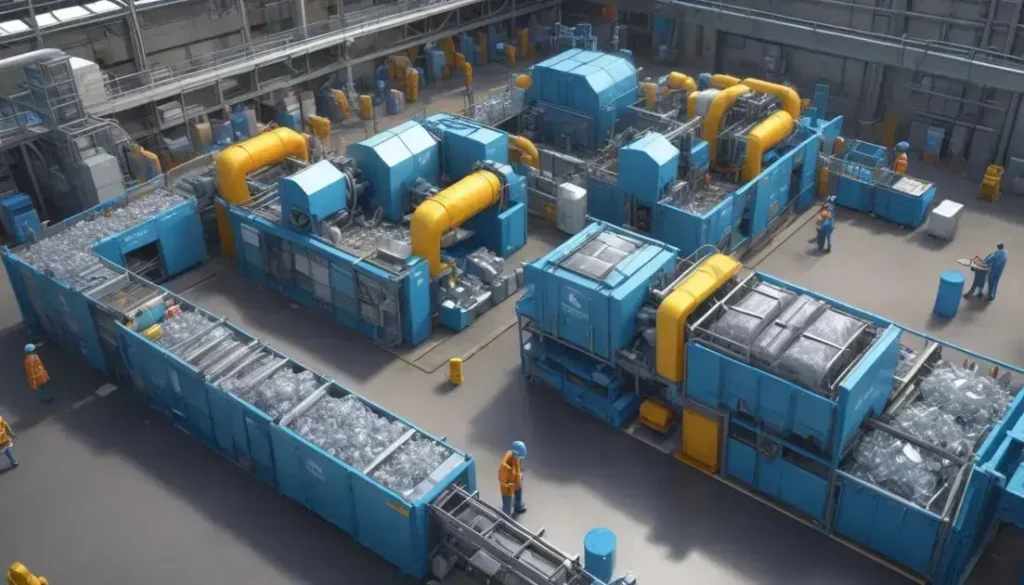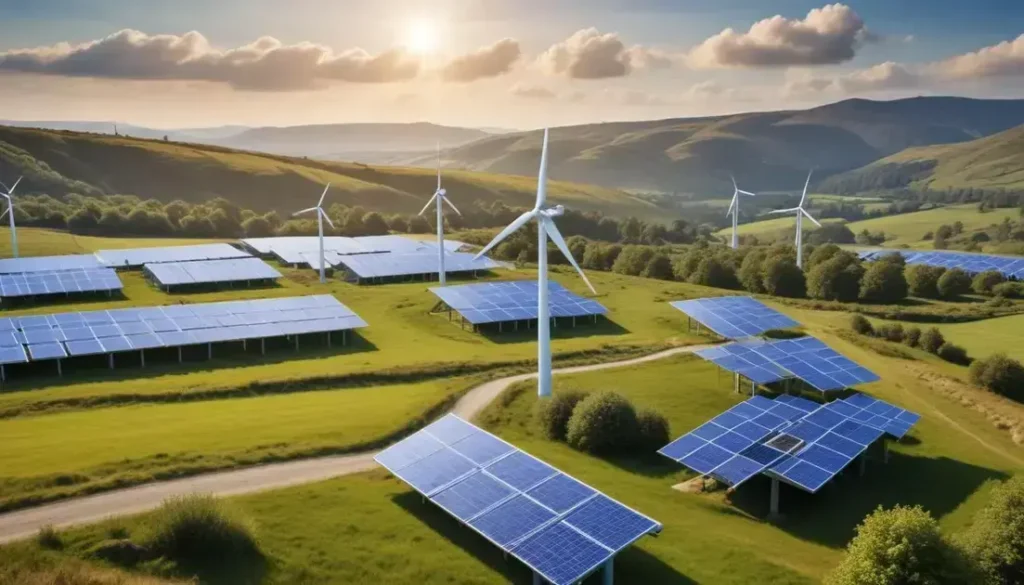Sustainable agriculture involves practices that protect the environment while ensuring food security, promoting economic viability for farmers, and enhancing community well-being through responsible consumption and production methods.
The **sustainable food** sector presents both challenges and opportunities as we seek innovative solutions for pressing global issues. How can we adapt to feed a growing population?
Introduction to the global food system
The global food system is a complex network that encompasses everything from production to consumption. It includes farmers, suppliers, distributors, and consumers, all contributing to the vast journey of food from field to plate. Understanding this system is essential for tackling current challenges such as food security and climate change.
Key issues within the global food system include unequal access to resources and the increasing demand for food as the population grows. With an expected population of nearly 10 billion by 2050, there is an urgent need to innovate and transform agricultural practices. Sustainable farming techniques offer solutions by enhancing productivity and minimising environmental impacts.
Furthermore, the interconnectivity of this system means that changes in one part can significantly affect others. For instance, shifts in regulations or market demands ripple across nations. As we navigate these transitions, collaboration among stakeholders is vital. Governments, NGOs, and businesses alike must work together to implement strategies that support a robust food system, ensuring resilience for future generations.
The need for transformation
The need for transformation in our food systems has never been more critical. With the rising global population and increasing environmental pressures, traditional agricultural methods are often insufficient. These methods can lead to soil degradation, water scarcity, and heightened greenhouse gas emissions, threatening the sustainability of food production.
A shift towards sustainable practices is essential for meeting these challenges head-on. This includes implementing techniques such as crop rotation, organic farming, and precision agriculture. These approaches not only enhance yields but also preserve vital resources for future generations.
Moreover, consumers are becoming increasingly aware of the impact their food choices have on the environment. There is a growing demand for transparency in food sourcing and production. Farmers and producers who adopt sustainable methods can differentiate themselves in a competitive market, appealing to eco-conscious consumers.
Government policies and incentives play a crucial role in facilitating this transformation. By supporting research and development in sustainable agriculture, policymakers can foster innovations that lead to a more resilient food system. Collaboration between stakeholders, including farmers, businesses, and governments, is imperative to drive the necessary changes that benefit both people and the planet.
Projected population growth and impacts
Projected population growth poses significant challenges to global food systems. By 2050, the global population is expected to reach nearly 10 billion people, increasing the demand for food dramatically. This surge necessitates a reevaluation of current agricultural practices to ensure food security.
As populations grow, urbanisation trends further complicate food supply chains. More individuals are moving to cities, creating a higher concentration of consumers. This urban migration can strain food distribution networks, spotlighting the need for efficient logistics and infrastructure. To meet these challenges, innovations in farming and distribution are crucial.
The impacts of population growth also extend to environmental sustainability. Increased food production often correlates with greater resource extraction and environmental degradation. As demand rises, strategies focusing on sustainable agriculture become essential. This includes practices that minimise carbon footprints while maximising crop yields.
Additionally, policy adaptations are necessary to address these evolving circumstances. Governments must invest in research and development for sustainable agricultural technologies. By fostering new practices and supporting farmers, societies can ensure that food production keeps pace with growing populations and environmental responsibilities.
Sustainable practices in agriculture
Sustainable practices in agriculture are vital for addressing the pressing challenges our food systems face today. These methods focus on minimising environmental impacts while maximizing productivity. Techniques such as crop rotation, organic farming, and integrated pest management significantly reduce chemical inputs and enhance soil health.
Implementing agroecological practices not only improves biodiversity but also helps in maintaining ecosystem balance. For instance, diversifying crops can lead to healthier soils and reduce the risk of pest infestations. These practices contribute to a more resilient agricultural system that can withstand environmental stresses.
Water conservation is another critical aspect of sustainable agriculture. Techniques such as rainwater harvesting and drip irrigation ensure efficient water use, which is essential in areas prone to drought. By adopting these methods, farmers can sustain their yields while preserving vital water resources.
Moreover, educating farmers about sustainable practices fosters community engagement and collaboration. Sharing knowledge about sustainability enhances local economies and encourages the adoption of green technologies. As the global population continues to grow, embracing sustainable practices will be crucial for ensuring food security and environmental health.
Economic benefits of food system overhaul
The economic benefits of overhauling our food systems extend beyond immediate agricultural gains. Transitioning to sustainable food practices can stimulate local economies by creating jobs in agriculture, processing, and distribution. Sustainable methods often lead to reduced input costs, increasing profitability for farmers.
Investing in new technologies and research can enhance productivity and efficiency. For example, precision agriculture allows farmers to use resources more effectively, minimising waste and maximising yields. Such innovations can boost the overall economic performance of the agricultural sector.
Moreover, sustainable food systems can attract investment and support from both public and private sectors. Governments may offer financial incentives for adopting greener practices, leading to increased funding for infrastructure improvements and food safety measures. This not only supports current farmers but also encourages new entrants into the agriculture market.
The shift towards sustainability can improve food security and reduce costs associated with environmental degradation. Long-term savings from healthcare costs related to diet-related illnesses can also bolster economic health. By prioritising healthier food systems, communities can create a more resilient economy that adapts to the changing global landscape.
Understanding food security
Understanding food security is critical in today’s rapidly changing world. It refers to the availability, access, and utilisation of sufficient, safe, and nutritious food to maintain a healthy life. Food security is essential not only for individual well-being but also for economic stability and social cohesion within communities.
The concept comprises several dimensions: food availability, which ensures that food supplies are sufficient; food access, which enables people to obtain necessary foods; and food utilisation, focusing on the proper nutrition and dietary needs of individuals. Together, these aspects form a comprehensive framework for achieving food security.
Factors such as climate change, economic disparities, and political instability can undermine food security. Disruptions in supply chains can lead to shortages, forcing communities to adapt to emergency food provisions. Moreover, rising global populations put additional strains on agricultural systems, making it imperative to prioritise sustainability and resilience in food production.
Raising awareness about food security and its implications encourages community involvement and fosters policy initiatives. By emphasising education on sustainable practices and reducing food waste, we can ensure that everyone has access to the nutritious food they need for a healthy future.
Regional impacts on lower-income countries
The regional impacts of food system changes are particularly significant for lower-income countries. These nations often face unique challenges that exacerbate food insecurity and hinder economic growth. Many rely heavily on agriculture, making them vulnerable to fluctuations in food prices and climate change effects.
As global food policies evolve, lower-income countries may struggle to adapt. They often lack the resources required for sustainable practices, which can lead to declining yields and increased poverty rates. In regions where agriculture is the main source of livelihood, failing crop production can have devastating effects on local communities.
Furthermore, trade agreements and international regulations can disproportionately affect these countries. If new policies favour wealthier nations, lower-income countries risk being left behind in the global food market. This imbalance can hinder their ability to access essential nutrients and limit economic opportunities.
Building resilience in these regions requires targeted support from the global community. Investments in education, technology, and infrastructure can empower farmers to adopt sustainable practices. By focusing on regional strategies that account for local conditions and needs, we can promote food security and economic stability in lower-income countries.
The cost of inaction on global economy
The cost of inaction regarding food system transformations can profoundly impact the global economy. As climate change, population growth, and resource depletion accelerate, failing to address these challenges may lead to severe economic repercussions. Continuing with traditional agricultural practices can result in decreased productivity and heightened food insecurity.
Inaction can also exacerbate health problems. A decline in food quality could cause an increase in diet-related diseases, straining healthcare systems and increasing costs for governments and communities. The economic burden of these health issues can divert resources away from other critical areas, such as education and infrastructure development.
Moreover, ignoring sustainable agricultural practices limits the potential for job creation and economic growth in various regions. Investments in green technologies and sustainable farming methods can stimulate local economies, boosting productivity and creating new employment opportunities. Conversely, inaction may lead to job losses in agriculture and related sectors as productivity declines.
Global trade relationships also hang in the balance. Countries that fail to adapt may find themselves at a disadvantage in an increasingly competitive market. By taking proactive measures, nations can strengthen their position in global trade while promoting a sustainable future for agriculture. Ultimately, the cost of inaction not only hurts individual nations but can ripple through the entire global economic system.
Decarbonization efforts in agriculture
Decarbonization efforts in agriculture are essential for mitigating climate change and promoting sustainability. Agriculture is responsible for a significant portion of greenhouse gas emissions, primarily from livestock, soil management, and synthetic fertilisers. Implementing effective strategies to reduce these emissions is crucial for a healthier planet.
One major approach to decarbonization involves reducing fossil fuel dependence by transitioning to renewable energy sources for farming operations. Solar panels and wind turbines can power equipment and irrigation systems, drastically cutting emissions associated with energy use.
Additionally, regenerative agricultural practices play a vital role in sequestering carbon in the soil. Techniques such as cover cropping, no-till farming, and agroforestry enhance soil health and improve its capacity to store carbon. By prioritising these methods, farmers can contribute positively to the environment while maintaining productivity.
Moreover, innovative technologies such as precision agriculture can optimise resource use, further decreasing the carbon footprint. By precisely applying water, nutrients, and pesticides only when needed, farmers can significantly reduce waste and emissions.
Finally, ensuring that farmers receive education and access to sustainable practices is key. Supporting policies and initiatives that incentivise decarbonization can help create a more resilient agricultural sector while protecting the environment.
Investment in agricultural R&D
Investment in agricultural R&D is crucial for fostering innovation and ensuring food security in a changing world. Research and Development (R&D) in agriculture helps develop new technologies and practices that increase productivity while simultaneously addressing environmental concerns. The demand for sustainable and efficient agricultural practices is rising, making R&D investments essential for future success.
Investing in R&D can lead to breakthroughs in crop resilience and yield. Enhanced seed varieties, improved pest management strategies, and advanced irrigation techniques are a few examples of what research can offer. These innovations can significantly boost food production, ensuring that farmers can meet the needs of a growing population.
Moreover, agricultural R&D can play a fundamental role in sustainability. By researching and implementing innovative practices, such as precision agriculture, farmers can manage resources more effectively, reducing waste and environmental impact. Sustainable practices not only protect ecosystems but can also increase profitability in the long run.
Collaboration between governments, private sector organisations, and research institutions is vital for maximising the impact of R&D investments. By creating partnerships, stakeholders can share knowledge and resources, ultimately accelerating the pace of innovation in agriculture. Long-term funding strategies are necessary to cultivate ongoing progress in this vital sector for global sustenance.
Australia’s role in the global food landscape
Australia’s role in the global food landscape is increasingly significant, driven by its vast agricultural resources and strategic geographical position. As one of the world’s leading exporters of agricultural products, Australia plays a crucial part in providing food security not only for its own population but also for many countries across Asia and beyond. Key exports include meat, dairy, grains, and wine, which are highly sought after in international markets.
The country’s diverse climate allows for the cultivation of a wide range of crops, making it a viable supplier for various types of food. Additionally, Australia’s agricultural sector is committed to adopting innovative practices that enhance sustainability. This includes investing in environmentally friendly farming techniques that reduce resource usage and improve productivity.
Moreover, Australia’s strategic relationships with key trading partners, especially in the Asia-Pacific region, enhance its position in the global food supply chain. This relationship is vital as food demand continues to rise in rapidly growing economies. By strengthening trade agreements and cooperation, Australia can ensure it remains a key player in meeting global food needs.
As climate challenges persist, Australia’s efforts in research and development will be pivotal in maintaining its competitive edge. Emphasising resilient agricultural practices will enable Australia to adapt to changing conditions while continuing to contribute significantly to global food supplies.
Consumer behaviour and sustainability
Consumer behaviour plays a pivotal role in driving sustainability within food systems. As awareness of environmental issues rises, many consumers are shifting their preferences towards sustainable products. This change reflects a growing desire to support practices that minimise ecological impacts and promote ethical sourcing.
Understanding these shifts is crucial for businesses aiming to align with consumer values. Savvy consumers are increasingly informed, demanding transparency regarding where their food comes from, how it is produced, and its carbon footprint. They prefer products that are locally sourced, organic, or labelled as sustainable.
Furthermore, purchasing decisions can be influenced by social factors. Peer pressure, social media advocacy, and marketing campaigns centred on sustainability can amplify consumer interest in eco-friendly products. Brands that effectively communicate their commitment to sustainability can attract environmentally-conscious shoppers.
Moreover, consumers often seek to reduce food waste, favouring products with minimal packaging and longer shelf lives. They are willing to invest in quality over quantity, demonstrating a preference for foods that contribute positively to their health and the environment. This shift encourages food companies to innovate in packaging and production methods to meet consumer demands.
Ultimately, understanding consumer behaviour is essential for fostering a sustainable future in agriculture and food production. Businesses and farmers must adapt to these changing preferences to remain competitive in a rapidly evolving market.
Conclusion and call to action
The conclusion and call to action regarding sustainable agricultural practices is essential for ensuring a healthier planet and future food security. As consumers become more aware of the impacts of their choices, it is crucial for individuals, businesses, and governments to actively engage in promoting sustainable food systems.
Consumers can make a difference by choosing products that align with sustainability goals. Supporting local farmers, opting for organic produce, and reducing food waste are tangible steps that anyone can undertake. Each purchasing decision contributes to a collective effort to foster a more sustainable food landscape.
Businesses have a responsibility to innovate and adapt their practices. By investing in sustainable technologies and aligning with consumer preferences, companies can not only improve their market position but also contribute positively to environmental health. Transparency in sourcing and production is crucial for building trust with consumers.
Governments also play a vital role by creating policies that incentivise sustainable practices and support research and development in agriculture. Collaborating with communities and organisations will help amplify the impact of these initiatives.
Together, through informed choices and cohesive action among all stakeholders, we can pave the way for a sustainable future where food security is guaranteed for generations to come.
In Conclusion: Embracing Sustainable Practices in Agriculture
In today’s world, it is clear that adopting sustainable practices in agriculture is crucial for our future. By focusing on how we produce and consume food, we can protect the environment while ensuring food security for generations to come.
As consumers, we have the power to make choices that support sustainability. Simple actions like buying local produce, reducing waste, and choosing eco-friendly products can lead to significant changes. Every purchase we make can support farmers and companies that prioritize sustainable methods.
Businesses also need to step up and adapt by implementing innovative practices that reduce environmental impacts. The collaboration between consumers and businesses can accelerate the transition towards a more sustainable food system.
Governments play a fundamental role through policies that encourage sustainable agriculture and support research initiatives. By working together, we can successfully create an agricultural landscape that is not only productive but also beneficial for the planet.
Let’s embrace these sustainable practices today to create a healthier and more secure food future for everyone.
Frequently Asked Questions
What are sustainable agricultural practices?
Sustainable agricultural practices are methods that aim to produce food while protecting the environment, promoting biodiversity, and ensuring the well-being of farmers and communities.
How can consumers support sustainable agriculture?
Consumers can support sustainable agriculture by purchasing local, organic products, reducing food waste, and choosing brands that prioritize environmentally-friendly practices.
Why is sustainable agriculture important for food security?
Sustainable agriculture is important for food security because it ensures that food production can meet the needs of current and future generations without damaging the environment or depleting resources.
What role do businesses play in promoting sustainability?
Businesses can promote sustainability by adopting eco-friendly practices, investing in renewable resources, and engaging consumers in their sustainability efforts through transparency and education.
How can governments support sustainable agricultural practices?
Governments can support sustainable agricultural practices by creating policies that incentivise eco-friendly practices, providing funding for research and development, and promoting education on sustainable farming techniques.
What are the economic benefits of sustainable agriculture?
The economic benefits of sustainable agriculture include reduced costs through efficient practices, increased market demand for sustainable products, and job creation in emerging green sectors.


